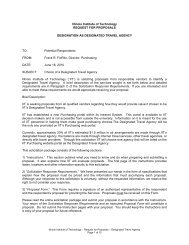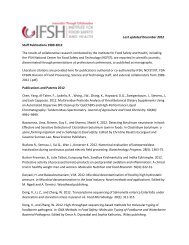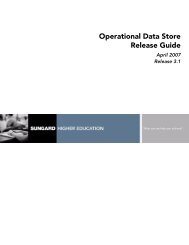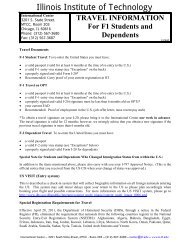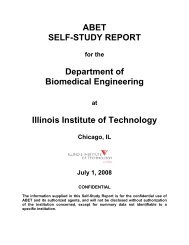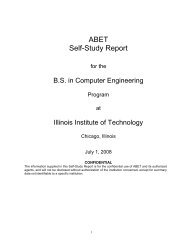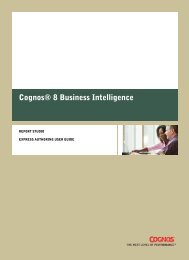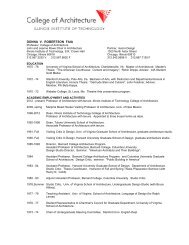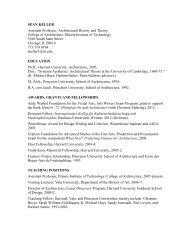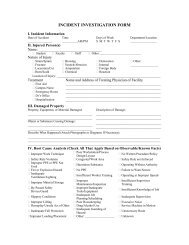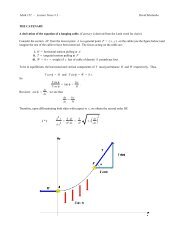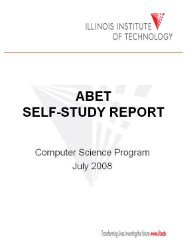Copyright & Disclaimer Information - Illinois Institute of Technology
Copyright & Disclaimer Information - Illinois Institute of Technology
Copyright & Disclaimer Information - Illinois Institute of Technology
Create successful ePaper yourself
Turn your PDF publications into a flip-book with our unique Google optimized e-Paper software.
210<br />
Course Descriptions<br />
Topics include decision theory, benefit/cost<br />
analysis, problem simulation,<br />
population projection, problem formulation<br />
and definition. Course will be<br />
taught using the case method. The<br />
course is <strong>of</strong> particular interest to students<br />
interested in applications <strong>of</strong><br />
quantitative models to solve public<br />
sector problems. (3-0-3) (S) (C)<br />
PS 425<br />
Rhetoric and Narrative in<br />
Legal Analysis<br />
During the first half <strong>of</strong> this small<br />
seminar, students will be provided<br />
with theoretical material drawn from<br />
literary theory and cognitive science<br />
on categorizations, narrative and<br />
rhetoric. They will read case studies<br />
demonstrating how this material provides<br />
useful analysis and understanding<br />
<strong>of</strong> legal thinking and can be<br />
used to analyze Supreme Court opinions.<br />
During the second half <strong>of</strong> the<br />
course, students will apply the techniques<br />
learned in undertaking their<br />
own analysis <strong>of</strong> judicial opinions,<br />
briefs and testimony <strong>of</strong> experts. For<br />
people intending to practice law, the<br />
course provides skills that are useful<br />
in construction and analysis <strong>of</strong> legal<br />
arguments. For others, the course<br />
provides techniques fostering understanding<br />
<strong>of</strong> the manner in which<br />
courts and experts reach and justify<br />
their conclusions. Prerequisite:<br />
Consent <strong>of</strong> instructor. (3-0-3)<br />
PS 440<br />
Issues in Globalization<br />
Globalization has become a powerful<br />
buzzword in social science and in popular<br />
discourse. This course utilizes a<br />
sociological perspective to examine<br />
the economic, socio-political, and cultural<br />
aspects <strong>of</strong> globalization within<br />
the context <strong>of</strong> contemporary debates<br />
about the phenomenon. Prerequisite:<br />
A social science course or consent <strong>of</strong><br />
instructor. (3-0-3) (S) (C)<br />
PS 442<br />
Race and Ethnicity in International Perspective<br />
The course examines the conceptual<br />
construction <strong>of</strong> race and ethnicity in<br />
different societies around the world<br />
at various eras. The course pays special<br />
attention to the causes and consequences<br />
<strong>of</strong> racial and ethnic conflict<br />
and cooperation for cultural<br />
<strong>Copyright</strong> & <strong>Disclaimer</strong> <strong>Information</strong>: <strong>Copyright</strong> © 1994, 1995, 1996, 1997, 1998, 1999, 2000, 2001, 2002, 2003, 2004, 2005, 2006, 2007. CollegeSource®, Inc. and Career Guidance Foundation. CollegeSource® digital catalogs are derivative works owned and copyrighted by CollegeSource®, Inc. and Career Guidance Foundation. Catalog content is owned and copyrighted by the appropriate school. While CollegeSource®, Inc. and Career Guidance Foundation provides information as a service to the public, copyright is retained on all digital catalogs.<br />
<strong>Copyright</strong> & <strong>Disclaimer</strong> <strong>Information</strong>: <strong>Copyright</strong> © 1994, 1995, 1996, 1997, 1998, 1999, 2000, 2001, 2002, 2003, 2004, 2005, 2006, 2007. CollegeSource®, Inc. and Career Guidance Foundation. CollegeSource® digital catalogs are derivative works owned and copyrighted by CollegeSource®, Inc. and Career Guidance Foundation. Catalog content is owned and copyrighted by the appropriate school. While CollegeSource®, Inc. and Career Guidance Foundation provides information as a service to the public, copyright is retained on all digital catalogs.<br />
groups, and also from the perspective<br />
<strong>of</strong> national and state institutions.<br />
Same as SOC 442. (3-0-3) (S) (C)<br />
PS 452<br />
Bureaucracy<br />
Analyzes bureaucracy in its social context.<br />
The evolution <strong>of</strong> the theory and<br />
practice <strong>of</strong> bureaucracy as a form <strong>of</strong><br />
control, coordination, and social order<br />
are considered. Emphasizes government<br />
bureaucracies, with selected<br />
examples from other organizations.<br />
(3-0-3) (S) (C)<br />
PS 453<br />
Regulatory Policy and Politics<br />
Examines the changing role <strong>of</strong> government<br />
regulation <strong>of</strong> private and public<br />
activities from a political and administrative<br />
perspective. Explores reasons<br />
for the growth <strong>of</strong> government<br />
regulation from the Progressive era<br />
through the New Deal to the social<br />
regulation <strong>of</strong> the 1970s and for the<br />
subsequent controversy over economic<br />
and social deregulation. Investigates<br />
the regulatory process, including<br />
administrative law, standards for<br />
rule-making, and the involvement <strong>of</strong><br />
organized groups and the courts.<br />
Studies specific cases from such areas<br />
as transportation, environment, energy,<br />
public health and research and<br />
development. (3-0-3) (S) (C)<br />
PS 462<br />
American Governmental Institutions<br />
An advanced course in American government<br />
intended to develop knowledge<br />
and analytical skills to assess<br />
how well our government works and<br />
how it might work better. The course<br />
focuses on the operation <strong>of</strong> federal<br />
executive, legislative and judicial<br />
institutions, the policy-making<br />
process (including the role <strong>of</strong> administrators),<br />
and the power exercised<br />
by organized groups, experts and the<br />
media. (3-0-3) (S) (C)<br />
PS 465<br />
Political Economy<br />
An introduction to political economy<br />
exploring the relationship between<br />
economy and government or political<br />
system. Role <strong>of</strong> the state, role <strong>of</strong> the<br />
market, impact <strong>of</strong> the economic ideologies<br />
on political and economic systems<br />
will be examined. Structure <strong>of</strong><br />
IIT Undergraduate Bulletin 2006–2008<br />
political and economic interests and<br />
the mediating effects <strong>of</strong> institutions<br />
on political and economic outcomes<br />
will be examined. Normative issues<br />
connected to ideal political and economic<br />
institutions and appropriate<br />
political and economic institutions<br />
and outcomes will be examined.<br />
Prerequisite: Consent <strong>of</strong> instructor.<br />
(3-0-3) (S) (C)<br />
PS 477<br />
Topics in the Study <strong>of</strong> Politics<br />
Provides students a reading and<br />
seminar course on a selected topic <strong>of</strong><br />
politics. Subject matter will change<br />
in successive <strong>of</strong>ferings <strong>of</strong> the course.<br />
(3-0-3) (S) (C)<br />
PS 497<br />
Directed Readings in Political Science<br />
Consists <strong>of</strong> independent reading and<br />
analysis, centered on particular problems<br />
and supervised by a member <strong>of</strong><br />
the political science faculty.<br />
Prerequisite: Consent <strong>of</strong> instructor.<br />
(Credit: Variable; maximum 4 credit<br />
hours) (S) (C)<br />
Psychology<br />
PSYC 100, 101<br />
Introduction to Pr<strong>of</strong>ession<br />
Introduction to psychology and<br />
social science pr<strong>of</strong>essions. Topics<br />
include problem formulation and<br />
career opportunities, spreadsheets<br />
and relevant computer applications,<br />
as well as data search tools. (2-0-2);<br />
(2-0-2) (C)<br />
PSYC 203<br />
Undergraduate Statistics for the Behavioral Sciences<br />
The objectives <strong>of</strong> this course are to<br />
develop skills in using statistical data<br />
analysis commonly used in the<br />
behavioral sciences (eg. descriptive<br />
statistics, ANOVA, regression, correlation).<br />
At the end <strong>of</strong> the course students<br />
should be able to comprehend<br />
statistical research findings, run<br />
basic statistical analysis, as well as<br />
make inferences from the results.<br />
This course is equivalent to MATH 221 .<br />
Students may not receive credit for<br />
both MATH 221 and PSYC 203. (3-0-3)



